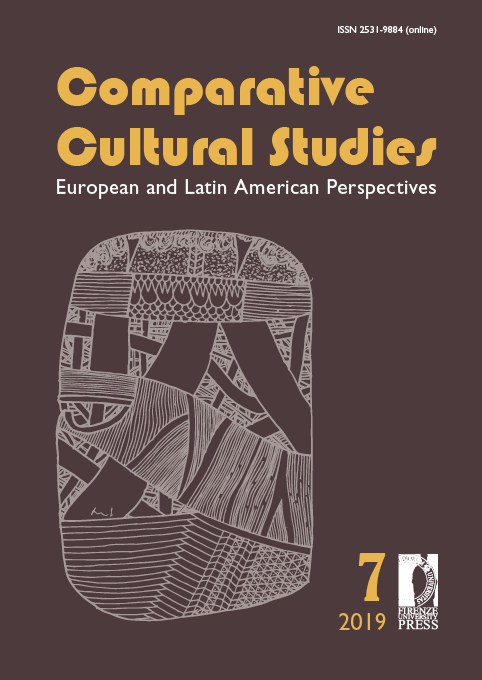Interrogating migration and “illegality”: weaving ethical and epistemological concerns in a research process
DOI:
https://doi.org/10.13128/ccselap-25823Abstract
AAVV
Downloads
References
Anderson, B., & Ruhs, M. (2010). Researching Illegality in Labour Migration: Concepts, Ethics and Policy Nexus. Population, Space and Place, 16 (3), 175-179.
Bacci, M. (2014). Security, protection and family norms: Gendered and selective regulations of marriage and migration in Italy and Portugal. Journal for Educators, Teach-ers and Trainers, Vol. 5(3), 141 – 155.
Bacci, M. (2016). Illegalization and social inequality in the regulation of marriage and migration control in Portugal. In M. Grassi & T. Ferreira. Mobility and Family in Transnational Space. UK: Cambridge Scholars Publishing, 31-54.
Blázquez, N., Flores, F., Rios, M. (eds.).(2010). Investigación feminista: epistemología, metodología y representaciones sociales. Cd. De México: UNAM/ centro de investiga-ciones interdisciplinarias en ciencias y humanidades.
Bryceson, D, & Vuorela, U. (eds.) (2002). The Transnational Family: New European Fron-tiers and Global Networks. UK: Bloomsbury Academic.
Castro-Gómez, S., Grosfoguel, R. (2007). El giro decolonial. Reflexiones para una diversi-dad epistémica más allá del capitalismo global. Bogotá: Siglo del hombre Editores.
Charsley, K. (2005). Unhappy husbands: Masculinity and migration in transnational Paki-stani marriages. Journal of the Royal Anthropological Institute, 11(1), 85–105.
Crenshaw, K. (1991). Mapping the margins: Intersectionality, identity politics and violence against women of color. Stanford Law Review, 43(6), 1241–1299.
Cukut, S. (2011). The Role of Ethnicity in Qualitative Migration Research. Migracijske I Etničke Teme, 27 (2), 161–175.
De Genova, N. (2002). Migrant “illegality” and deportability in everyday life. Annual Review of Anthropology, 31, 419–447.
Duvell F, Triandafyllidou A, Vollmer B. (2008). Ethical issues in irregular migration research. [Report] Report on Ethical Issues, Deliverable D2 prepared for Work Pack-age 2 of the research project CLANDESTINO Undocumented Migration: Counting the Uncountable. Data and Trends Across Europe, funded by the 6th Framework Programme for Research and Technological Development Research DG, Euro-pean Commission. Recuperado de http://irregularmigration.net/typo3_upload/groups/31/4.Background_Information/4.1.Methodology/EthicalIssuesIrregularMi-gration_Clandestino_Report_Nov09.pdf, (20/04/2019).
Gil, S. (2010). Una sociología (de las migraciones) para la resistencia. EMPIRIA. Revista de Metodología de Ciencias Sociales, 19, 235–249.
Glick, N. (2005). Transnational social fields and imperialism. Anthropological Theory, 5(4), 439–461.
Gonzalez, P., Bacci, M. (2015). Mujeres-vulnerables, Mujeres-víctimas. Explorando per-spectivas críticas sobre categorizaciones y prácticas institucionales en situaciones de violencia patriarcal y migración. Tramas/Maepova, 3(4), 121–135.
Government of Portugal. (2007). Law no 23/2007. Government of Portugal. Recuperado de http://www.sef.pt/documentos/56/Act29_2012ofAugust9.pdf, (20/04/2019).
Grassi, M., & Giuffré, M. (2013). Vite (il)legali. Migranti africani in Italia e Portogallo. Ita-lia: SEID.
Gregorio, C. (2009). Colonizando los cuerpos: fronteras en la representación de las «mujeres inmigrantes». Cuadernos del Ateneo, 28, 47–56.
Grosfoguel, R. (2012). Sujetos coloniales: una perspectiva global de las migraciones. Ecua-dor: Abya Yala.
Harding, S. (1993). Rethinking Standpoint Epistemology: What is “Strong Objectivity.” In L. Alcoff, y E., Potter. Feminist Epistemologies (pp.49-82). London: Routledge.
Hondagneu, P. (2011). Gender and Migration Scholarship: An Overview from a 21st Cen-tury Perspective. Migraciones Internacionales, 6(1), 219–233.
Hooks, B. (2015). Ain’t I A Woman: Black Women and Feminism. London: Routledge.
Kofman, E. (2002). Contemporary European migrations, civic stratification and citizen-ship. Political Geography, 21(8), 1035–1054.
Kolossov, V.(ed). (2012). EU borderscapes project. State of the Debate Report I. [report] European Commission. Recuperado de http://www.euborderscapes.eu/fileadmin/user_upload/EUBORDERSCAPES_State_of_Debate_Report_1.pdf, (20/04/2019).
Levitt, P., Glick, N. (2004). Conceptualizing Simultaneity: A Transnational Social Field Perspective on Society. International Migration Review, 38(145), 1002–1039.
Levitt, P., Jaworsky, N. (2007). Transnational Migration Studies: Past Developments and Future Trends. Annual Review of Sociology, 33, 129–156.
Mahler, S., & Pessar, P. (2006). Gender Matters: Ethnographers Bring Gender from the Periphery toward the Core of Migration Studies. International Migration Review, 40(1), 27–63.
Morin, E. (1989). Para uma sociologia do conhecimento. Sociologia, Problemas e Práticas, 6, 135–146.
Pussetti, Ch., & Barros, V. (2012). Outros corpos: imigração, saúde e etnopolíticas da cidadania. Saúde e Multiculturalidade, 22, 23–31.
Riaño, Y. (2011). “He”s the Swiss citizen, I’m the foreign spouse’: Binational marriages and the impact of family-related migration policies on gender relations. In A. Kraler, E. Kofman, M. Kohli M., C. Schmoll. Gender, Generations and the Family in Interna-tional Migration. Amsterdam: University Press, 265-283.
Sayad, A. (1999a). Immigration et “pensée d’État.” Actes de la Recherche en Sciences Social-es, 129(Délits d’immigration), 5–14.
Sayad, A. (1999b). La double absence. Des illusions de l’émigré aux souffrances de l’immigré. Paris: Le Seuil.
Sciortino, G. (2004). Between phantoms and necessary evils. Some critical points in the study of irregular migrations to Western Europe. IMIS-Beiträge Institute for Migra-tion Research and Intercultural Studies (IMIS), Osnabrück, 24 (Special Issue “Migra-tion and the regulation of social integration”), 17–44.
Segato, R. (2012). Género e colonialidade: em busca de chaves de leitura e de um vocabu-lário estratégico decolonial. e-cadernos CES, 18, 106–131.
Spivak, G. (1994). Can the Subaltern Speak? In Colonial discourse and post-colonial theory, edited by Williams, Patrick and Chrisman Laura. Columbia: Columbia University Press, 66-111.
Stolke, V. (2006). O enigma das intersecções: classe, “raça”, sexo, sexualidade. A formação dos impérios transatlânticos do século XVI ao XIX. Estudos Feministas, 14(1), 15–42.
Van Houtum, H., Kramsch, O., & Zierhofer, W. (eds). . (2005). B/ordering space. Ashgate.
Van Houtum, Henk, & Van Naerssen, Ton (2002). Bordering, ordering and othering. Tijd-schrift Voor Economische En Sociale Geografie, 93(2), 125–136.
Yuval Davis, Nira. (2011). Power, Intersectionality and the Politics of Belonging (No. Work-ing Paper Series n. 75). Aalborg: Institut for Kultur og Globale Studier, Aalborg Uni-versitet.
Downloads
Published
How to Cite
Issue
Section
License
Copyright (c) 2019 Marianna Bacci

This work is licensed under a Creative Commons Attribution 4.0 International License.
This licence allows third parties to share (copy and redistribute the material in any medium or format) and adapt (remix, transform and create from the material for any purpose, including commercial purposes), provided that authorship and first publication in this journal (The Journal, DOI of the work) is acknowledged, a link to the licence is provided, and it is stated whether changes have been made to the work.







